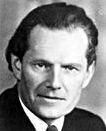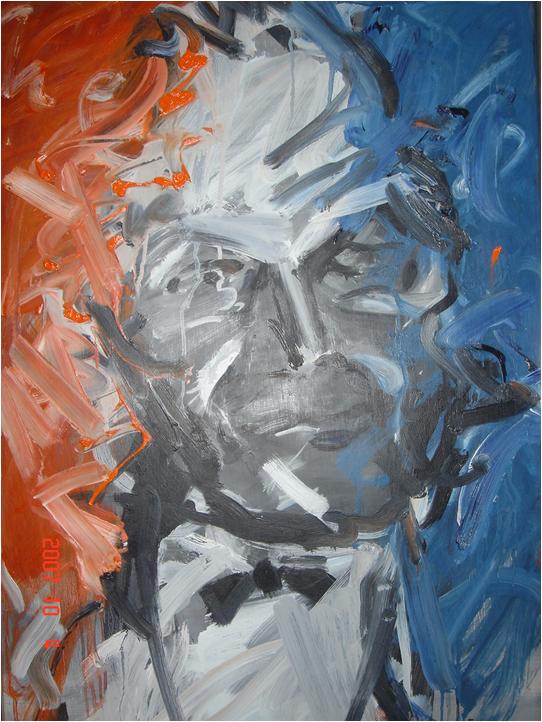|
Osnabrück, 27. Sept. 1965 written by Hans Calmeyer, translated by Michael:
Dear Dr. Presser!
My Son Peter, archaeologist, brought to me from a visit in Leiden yesterday evening the two volumes of your book “The Destruction of the Dutch Jews” for which I had already been expectant based on a commentary in the weekly “Die Zeit.”. I spent the last two days reading in the two volumes with intense interest.
In this, my interest is not principallly in my own person and my participation in suffering and guilt. Instead, the topic of Destruction of a People has not left me alone since 1941. I am unreconciled to this day with myself, and above all with our shared guilt and failure to act.
And it is then almost a consolation to have to read in your two volumes that it is no different for you and for so many others. At one point you ask yourself, the historian: “Are we now through it all?” No, we are definitely not finished with the events and our part in those events, whether we were operational or suffering participants. All actions we took were, as you rightly recognize, insufficient, if not nearly criminal.
The well-intentioned observer of those days, had he even had occasion to act in intervention, in helpful assistance, or resistance, must surely have comprehended the following:
Every Act, every helpful activity, was too little, too little. We did everything incorrectly. As happened to everyone, as filled as the earth is with suffering:
Jedes Handeln, jedes helfende Tun war ein
zu Wenig, zu Wenig!
>>Wir haben alles falsch gemacht!<<
>>Wie über alle hin das Leid geschah, von dem die Erde
voll ist bis zum Rand.<<
Why am I so eager to thank you? Why do I use the preamble at the beginning of this letter? It is clear to me in my perception and sense that you wrote the volumes in despair, and that you still remain despondent. This just as I am. I am still despondent today. Beyond even that, I have come to a firm conviction: anguish, to be anguished is the only position that is worthy or of any value that we can accept, confronted by the facts, and having to judge and work through those facts.
I thank you above all for the understanding and compassion which you maintained through the two volumes, for those sufferors drawn into the maelstrom of events, passive or among the helpers, morally compelled to do something or anything in every daily activity, yet who failed to do so.
Let me assure you that I mean first and foremost the members of the Joodse Rat, the members of my colleagues among the Dutch lawyers, not least my greatly admired and now deceased Mr. Frederiks. Surely his actions too were insufficient. He also did not do all the right things. What he wanted to do, though unfortunately little understood, was with a clean and passionate heart, good intent, even if it followed already in 1942 along a mistaken path. Dr. Frederiks in fact stood as a bulwark. He was more brave than you could have perceived. Sure: he only helped people that he knew. I saw that already then as fundamentally wrong. In my ignorance, I imagined that one should never do anything for someone whose interests would have a return benefit, perhaps even for one that simply was a sympathetic individual. I feared a contaminating effect, which would darken the motives of help and rescue, and lessen the final success.
As irrational as it may sound: I did not think it God-pleasing. But there are a number of small trees in Israel, which were planted in recognition of such not-God-pleasing and rescued acquaintances of Dr. Frederiks, and are there as a memorial to Dr. Frederiks himself ! Rightly so, as I believe today ! For he is dead.
I have you to thank for the careful words which you found for my co-worker Dr. Wander. Since he is deceased, yes, since he belongs to the good group of the fallen on the Walstatt, it should not be right to speak of his ambiguity of will, or of his acts or failure to act. He was, as you and the documents would not know, part of the “Red Chapel” group, his death absolves him of any criticism. There are few compatriots of mine, who risked life in resistance as he did, specifically in engagement for the Dutch, for friends, in other words, for humanity.
I have to thank you for your efforts, to properly guage Weinreb and his List. I had then, and not to this day, any contact, not even personal knowledge about origin, development, guilt or innocence of this List and of him as the named party. I believe that your thesis “All were guilty and innocent at once” is correct. For the survivors and still living, there only remains desperate exasperation.
Still: That it be so and that the despair is honestly admitted, is good and necessary. The reporter in “Die Zeit” asked who would translate your book into English. It is part of our despair that we must know: as necessary a translation and the publishing of that translation is, so un-read would it remain. Understand, Dr. Presser, THERE IS NO ONE LISTENING !
Already your compatriots will distance themselves from your inconvenient lecture, which is an honest and heartfelt attempt to give a just historical account. I have friends in Israel, whom I did not help, who are nevertheless alive. These friends have been counseling me for years on the topic that lies like a massive stone on my heart, to finally give up my desperation to tell the story. This does not work for me, and in fact should not. God said to Ezekiel:
“You must tell them. They will not hear you. Nevertheless: you must tell them !”
You have said it all ! All the bitterness of Ezekiel and other un-heeded prophets is contained in what you have written in desperation. But you should know, that the one or the other, and in fact one man of the German language, is reading what you have written, drinking in and listening to the heap of bitterness and exasperation which for him is a bitter swallow indeed. To that belongs the responsibility to pass on those words.
Alas, on German territory there are even fewer listeners (I cannot even call my compatriots compatriots anymore. Since 1941, if not already since 1933, I see as compatriots really only the victims. Only they are clean, or through their death cleansed as righteous).
I know of the anguish of those that escaped from all of our shared guilt and shared failure. There is so much to say ! Finally also about the one that you name so often in your two volumes, with citations and attempts to clarify. It is an unusually ambiguous young man that you describe, perhaps too comprehensively, under the name Hans Calmeyer in your two volumes. I mean to say that you do not quite hit the mark: he was definitely inadequate. You skipped over, as others did also, what bitterness, helplessness in fact, must have reigned in someone who foresaw since 1941, if not already since 1933, the Destruction of the Dutch Jews, and who knew that all action and resistance would remain inadequate, as you described.
The words “te weinig, te weinig” so little, so little ! The question: was our attempt “mensen te sparen” to save lives ... pleasing to God? - were already written large on every wall that C. stared at in the years since. That was true even of the walls on which the one or the other had hung a picture of Hitler. C. had, as you of course cannot know, never once at the time or since, the sightest intellectual stimulus in all of this. He was even then as exasperated as today, he knew already then about the inappropriateness and inadequacy of all efforts that could be made.
But: he did what he did, and failed to do what he failed to do. From the warmest heart, I remain what I am.
aus heißem Herzen.
Ich bleibe, was ich bin,
Ihr Hans Calmeyer
|


